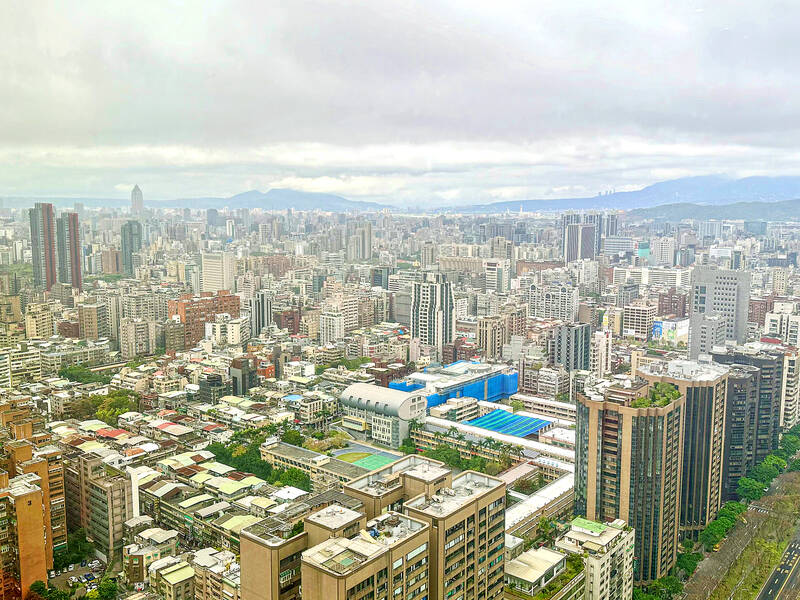The nation’s five major state-run banks extended NT$93.195 billion (US$2.95 billion) of new mortgages last month, the second-highest amount on record, central bank data released yesterday showed.
Total new mortgages extended by Bank of Taiwan (臺灣銀行), Land Bank of Taiwan (土地銀行), Taiwan Cooperative Bank (合作金庫銀行), Hua Nan Commercial Bank (華南銀行) and First Commercial Bank (第一銀行) last month decreased by NT$5.76 billion from a record NT$98.955 billion in the previous month, central bank data showed.
The monthly decline in new mortgages came as December last year was the peak season for delivery of new housing projects, which led to a higher comparison base, the central bank said.

Photo: CNA
Of the new mortgages, preferential housing loans for young people contributed 39.86 percent of the total last month, the highest since August last year — when the government started to provide low-interest mortgage rates for first-times buyers, the data showed.
The preferential housing loan program implemented by the Ministry of Finance increases the maximum loan amount from NT$8 million to NT$10 million and extends the loan period from 30 to 40 years, with the government and state-run banks subsidizing 0.375 percent of the mortgage rates.
The program also extends the grace period for repayment from three years to five years and the interest subsidy scheme is to last for three years until July 31, 2026, the ministry said.
Last month, the average mortgage rate charged by the five state-run banks fell to 2.073 percent, down 0.6 basis points from the previous month, as the preferential housing loan program carries lower mortgage rates, the central bank said.
However, the program has helped support the housing market since August last year, thanks to strong interest from first-time buyers and solid demand for self-occupied homes, it said.
In addition, the central bank said the outlook for the domestic housing market appears positive, given that property transactions in the six special municipalities climbed to 24,999 units last month, up 5.25 percent month-on-month and 98.2 percent year-on-year, citing data released by the six cities — Taipei, New Taipei City, Taoyuan, Taichung, Tainan and Kaohsiung — showed earlier this month.
Meanwhile, the composite index gauging business sentiment in the local property sector rose 0.65 points from a month earlier to 106.49 last month, marking the third consecutive monthly growth, the Taiwan Institute of Economic Research (台灣經濟研究院) reported yesterday, attributing the rise to the preferential home loan program for young people and the local stock market hovering at high levels recently.
Additional reporting by CNA

When an apartment comes up for rent in Germany’s big cities, hundreds of prospective tenants often queue down the street to view it, but the acute shortage of affordable housing is getting scant attention ahead of today’s snap general election. “Housing is one of the main problems for people, but nobody talks about it, nobody takes it seriously,” said Andreas Ibel, president of Build Europe, an association representing housing developers. Migration and the sluggish economy top the list of voters’ concerns, but analysts say housing policy fails to break through as returns on investment take time to register, making the

‘SILVER LINING’: Although the news caused TSMC to fall on the local market, an analyst said that as tariffs are not set to go into effect until April, there is still time for negotiations US President Donald Trump on Tuesday said that he would likely impose tariffs on semiconductor, automobile and pharmaceutical imports of about 25 percent, with an announcement coming as soon as April 2 in a move that would represent a dramatic widening of the US leader’s trade war. “I probably will tell you that on April 2, but it’ll be in the neighborhood of 25 percent,” Trump told reporters at his Mar-a-Lago club when asked about his plan for auto tariffs. Asked about similar levies on pharmaceutical drugs and semiconductors, the president said that “it’ll be 25 percent and higher, and it’ll

NOT TO WORRY: Some people are concerned funds might continue moving out of the country, but the central bank said financial account outflows are not unusual in Taiwan Taiwan’s outbound investments hit a new high last year due to investments made by contract chipmaker Taiwan Semiconductor Manufacturing Co (TSMC, 台積電) and other major manufacturers to boost global expansion, the central bank said on Thursday. The net increase in outbound investments last year reached a record US$21.05 billion, while the net increase in outbound investments by Taiwanese residents reached a record US$31.98 billion, central bank data showed. Chen Fei-wen (陳斐紋), deputy director of the central bank’s Department of Economic Research, said the increase was largely due to TSMC’s efforts to expand production in the US and Japan. Investments by Vanguard International

WARNING SHOT: The US president has threatened to impose 25 percent tariffs on all imported vehicles, and similar or higher duties on pharmaceuticals and semiconductors US President Donald Trump on Wednesday suggested that a trade deal with China was “possible” — a key target in the US leader’s tariffs policy. The US in 2020 had already agreed to “a great trade deal with China” and a new deal was “possible,” Trump said. Trump said he expected Chinese President Xi Jinping (習近平) to visit the US, without giving a timeline for his trip. Trump also said that he was talking to China about TikTok, as the US seeks to broker a sale of the popular app owned by Chinese firm ByteDance Ltd (字節跳動). Trump last week said that he had